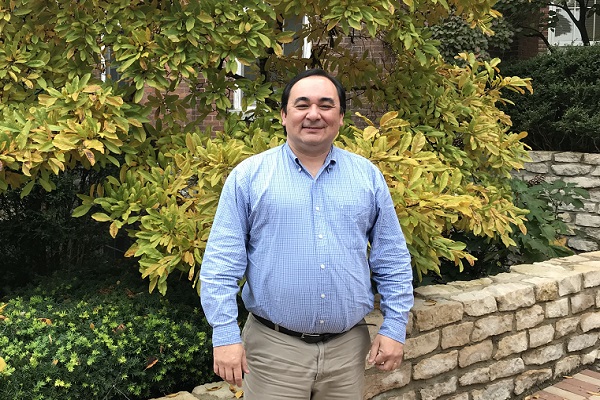Blogs

Flyers Embracing Global Experiences: Dr. Jason Combs
Dr. Jason Combs from the Department of Communication shares how his background as a Pilipino American and practicing Baha’i have shaped his personal and professional commitment to international education and exchange.
What has influenced or shaped your passion for international education/exchange?
There are a number of factors.
As I look at my person life, my mom came from the Philippines and met my dad in the States. At the time she arrived, she said in the Pilipino American community, there was an emphasis to simply be “American”—whatever that may have meant. So as a result I did not learn much about that part of my heritage or the language, although the food survived. My dad is from European descent. His side of the family has been here for centuries, so I identified more with them. Eventually, as an adult, I wanted to know more about my own diverse background and embrace it. It was a slow process.
With relation to my faith, my wife and I are both Baha’i, and one of the principles of the faith is that we are part of one human family, so embracing unity and diversity is important. This has encouraged me to think more about world citizenship and how we can provide travel opportunities for students to expand their understanding of them being part of a larger community (i.e. the world) and be exposed to different people from different cultural backgrounds.
As a result, these two experiences have come together to influence my passion for international education and exchange.
Can you share an intercultural experience or moment that inspired you?
I remember once taking a group of students to Belfast, Ireland. We were working with faculty at Queens University in Belfast, and they put an amazing program together that allowed us to explore “the Troubles” in northern Ireland and how much of the peace that came afterwards developed through a process of dialogue. The experience affected all of us because we were talking directly to people that had been impacted by loss but were part of the healing process. It is difficult to describe the impact because it was so powerful.
When I think of other examples, in other contexts, I think of the prejudice, distrust of others, or tribalization that sometimes exists and how it can damage and separate people. In Ireland, the students and I saw the efforts from people that are personally trying to work against that. I walked away a changed person and still talk about that experience and draw upon it when I talk about dialogue.
As a staff member how do you promote international education/exchange or expanded intercultural experiences whether through campus, community or around the world?
Study abroad is one way and I’m a strong advocate for it. In Communication 101, we talk about students building capacity that is part of intercultural interactions. I often draw upon stories from my travels and time being abroad. Other ways are through my work with dialogue. “Intercultural” can mean many things. However, whenever you have intercultural interaction, one ideal is to be able to engage in dialogue with other people in which the goal is to build understanding, not necessarily to argue who is right and wrong. Much of the work that I have done with others in the community involves building capacity for dialogue, which I see as very much connected to intercultural experiences and education.
What is one aspect or memory of home that you still embrace today?
I grew up in the Dayton area, so in the literal sense, this is my home. But my heart is in Appalachia, in eastern Kentucky. I shared earlier that I didn’t know my mom’s side of the family as well, but I knew my dad’s side of the family very well. The Combs family came to the mountains in Eastern Kentucky in the 1790’s or 1800’s. To this day my uncle and aunt live on land and my parents own land beside them that has been part of our family for ten generations. It’s a beautiful place and I associate it with my grandparents and extended family on my dad’s side. Much of my cultural identity is Appalachian. When I think about home, I think about roaming the mountains, hiking, and being with my family there.
Who is someone that has inspired you or you believe to be a role model for global leadership? Why?
‘Abdu’l-Bahá, the son of the founder of the Baha’i Faith. ‘Abdu’l-Bahá was the head of the Baha’i faith after the death of his father Baha’u’llah. He was an exile and prisoner for 40 years, much of which was in Akka, Israel, but freed in later years of his life as a result of political shifts in the Ottoman Empire. Upon being freed, he went on an extended trip through Europe and then came to U.S. He was here for 256 days. What was significant was that he met with anyone that would meet with him and shared ideas about unity and diversity, the elimination of prejudice, and this idea that human beings are part of a global community. This was in 1912, so these ideas were radical for this time. If anyone were to read his talks they would see the gentleness in which he offered these thoughts.
If you had to pick a life motto or quote, what would it be? Why?
There are many that I would live by but one that Baha’u’llah, the Baha’i founder, said that resonates with me: “The Earth is but one country and mankind its citizens. “
